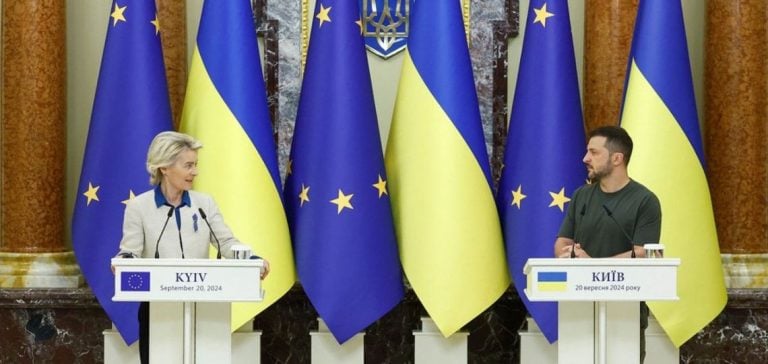Ukraine, weakened by months of targeted bombing of its critical infrastructure, receives financial support from the European Union. The €35 billion loan, announced by Ursula von der Leyen, aims to stabilize Ukraine’s energy system as winter approaches. The country has lost a large part of its electricity production capacity, sharply reducing its energy independence.
The loan is unconditional and will be directly integrated into the state budget, enabling the Ukrainian government to prioritize its allocation to the most critical sectors.
The main objective is to prevent a major energy crisis, exacerbated by the loss of power generation capacity.
Much of this funding comes from Russian assets frozen in the European Union since the start of the conflict in February 2022.
Some 200 billion euros worth of assets are currently frozen, the majority of which are held in Belgium through Euroclear.
This freeze follows Russia’s invasion of the Ukraine, and was approved by the 27 member states of the European Union last May.
The release of these funds demonstrates the EU’s determination to support Ukraine, while stepping up its own economic pressure measures against Russia.
Strengthening energy infrastructures and electricity exports
In addition to the loan, the European Union plans to increase its electricity exports to Ukraine, helping to meet the country’s energy needs, particularly during the winter months.
At present, Ukraine’s energy capacity is insufficient to meet the needs of its population and support its industries.
According to the International Energy Agency (IEA), more than two-thirds of the country’s energy production capacity has been destroyed.
The EU’s efforts are therefore twofold: to help repair damaged infrastructure and to provide immediate energy support.
In the short term, around 25% of the country’s energy needs should be covered by European exports, while investments in long-term solutions, such as renewable energies, are envisaged.
These efforts also include €160 million in humanitarian aid, including the installation of solar panels to compensate for the loss of electricity production.
Political and military challenges weigh on the economy
While Ukraine attempts to stabilize its economy in the face of these energy difficulties, it continues to face a constant military threat.
The Russian army is keeping up the pressure on several fronts, notably in the east of the country, where regular bombardments also target industrial and logistical infrastructures.
The Ukrainian economy, already in difficulty before the start of the conflict, is now heavily impacted by these incessant strikes.
While financial support from the European Union is crucial to keep the country’s economy afloat, it will not be enough to offset all the economic and industrial losses.
For several months now, Ukraine has been calling for increased military support, particularly in the form of long-range weapons, in order to strike strategic targets in Russia.
However, this request divides Ukraine’s allies.
While some, like the UK, are in favor of this option, others fear a military escalation that could trigger an even more aggressive response from Russia.
Geopolitical tensions surrounding the use of Russian assets
The financing of the Ukrainian loan by frozen Russian assets in Europe raises questions about the use of these funds for economic and humanitarian purposes.
While the idea of using these assets to support Ukraine has been widely endorsed by member states, some observers point to the risks of such a move, particularly as regards the legality of using funds belonging to a sovereign state.
Nevertheless, this decision marks a turning point in European policy, which seeks to strengthen economic sanctions against Russia while supporting Ukraine’s reconstruction efforts.
With the war seemingly bogged down and the prospects for peace still uncertain, the question of financing Ukraine’s reconstruction efforts remains a central topic of discussion within European bodies.
Increased dependence on Western partners
With this loan and European energy support, Ukraine is becoming increasingly dependent on external aid to keep its economy running.
While this aid is essential in the short term, it raises the question of the long-term viability of the Ukrainian economy, which has been severely damaged by the war and whose national resources are no longer sufficient to support the needs of the population.
The growing involvement of European and international institutions in the management of Ukrainian finances could also redefine economic relations between Ukraine and its Western partners.
While the country has officially begun negotiations for future membership of the European Union, the road ahead remains long and full of pitfalls.
Efforts to stabilize the country, both economically and in terms of energy, will largely depend on external support in the years to come.






















